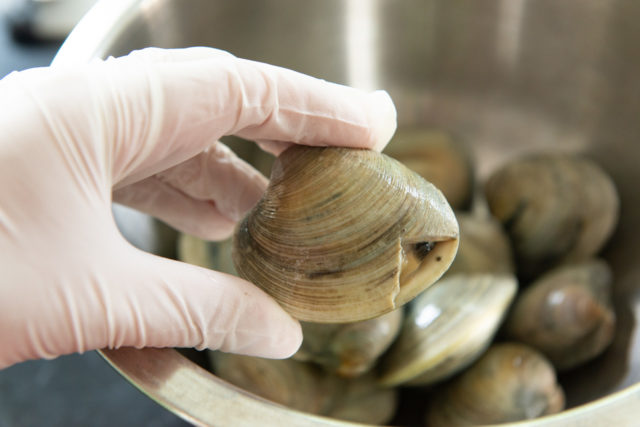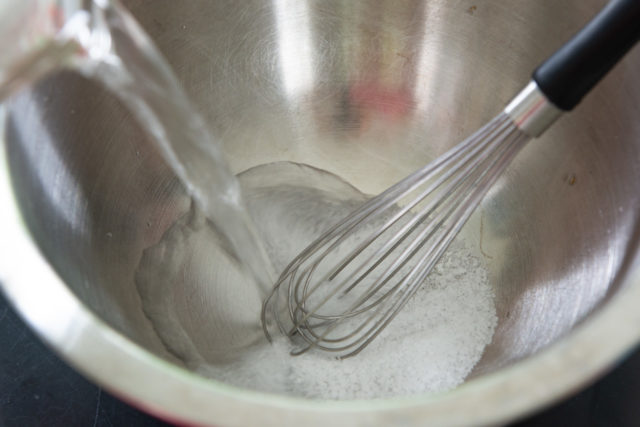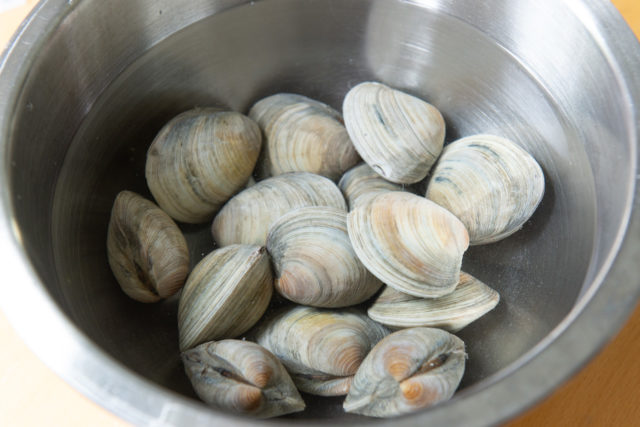I’ve tried a lot of nonsense for cleaning clams and purging out the inner gunk, and this is what actually works for me time and time again. Nothing ruins the greatness of a freshly steamed, briny littleneck clam like chomping down into a bunch of sand and grit. Here’s the best way to clean sandy clams!
Even though a lot of people think the fresh clams at the grocery store are already cleaned – and I’m sure they are, to some degree – if I steam them right away with just a quick rinse, I find an off-putting amount of grit and junk inside.
There are a million different recommendations, the most common I see involving cornmeal or simply soaking in freshwater for 20 minutes.
I find that soaking in plain water for 20 minutes doesn’t actually do much. And ditto to the cornmeal. Cornmeal does nothing.
Below is everything I do for an enjoyable grit-free clam experience, and while the amount of gunk that comes out varies batch to batch, I always get a good amount of filth in the water.
All you need to do is make a salt water with some precise measurements I’ll share below, and the live clams will purge the gunk inside with some time.
Overnight is what I normally do with a 50-clam limit of Western littlenecks and 4 to 10 horseneck or Washington clams. I submerge the clams by about 1 1/2 to 3 inches of seawater and cover the container they’re in — clams spit water, so you don’t want them sprinkling the inside of your fridge or basement.

Not making them right away?
I like to make the clams the same day I buy them. This is the best option for freshness, but if you must, you can save them for a day.
If you want to store the clams for later: Keep them over ice in the fridge in an open container, so they can breathe. And don’t keep them longer than one day.
Generally the fishmonger will only pack tightly closed clams without big chips or cracks in the shell, but occasionally they miss some.
This is an example of a clam that is best thrown away:

I know it stinks because you’ve paid for it, but it’s not worth the risk.
I will admit there have been a few times when I’ve cooked clams like these anyway if I saw them alive and out of the shell during my soak, and while they do open, they often don’t taste right. Throw them out from the start.
As far as little chips, I usually don’t mind those right along the edge if they’re tiny.
Prepare the Salt Water for Purging/Soaking
In a large bowl, combine 30 grams of sea salt with 1000 grams of cold tap water. Ideally you don’t want the water to get warmer than about 70F even as it sits, so start it out as cold as the tap will run.
Weigh both the salt and the water if you can, but if you don’t have a scale, it’s about 2 tablespoons of salt in a liter of fresh water (4 cups-ish).

Whisk for about 30 seconds, which should dissolve the salt in the water. Make sure there is none left in the bottom of the bowl.
Now add the cleaned clams to the salted water, making sure they are submerged, and set the bowl in a cool place on the counter.

30 grams of salt in 1000 grams of water is the ratio I have found to be perfect for soaking, which I tweaked slightly from this fantastic article by Hank Shaw.
He recommends a little higher salt in the water, but I find if I go higher than this, the clams taste saltier than when I bring them home from the store, so I go slightly lower.
It’s also commonly said that ocean water is perfect for soaking, but I have never tried this due to lack of access.
What Are Effective Methods to Rid Clams of Sand? : Seafood & Fish
FAQ
Can you keep clams in water in the fridge overnight?
Can clams be soaked overnight?
Can clams be submerged in water?
How do you keep clams from drying out?
Cover the container holding the clams with a damp towel. A damp towel will keep the clams from drying out, but it will also allow them to get fresh air. Don’t cover them in plastic or they’ll smother. If you like, you can use damp paper towels instead of a cloth towel. Store the clams in the back of the fridge.
How do you store clams in the fridge?
If you like, you can use damp paper towels instead of a cloth towel. Store the clams in the back of the fridge. Since cold air escapes every time you open the door, the back of your fridge is usually the coldest part of the fridge. The clams should be kept at a temperature between 32–35 °F (0–2 °C).
How long do you leave clams in saltwater?
After about 30 minutes, carefully lift the clams out of the saltwater solution, being cautious not to disturb the settled sand and grit at the bottom. Rinse the clams once again under cold running water to ensure they are free from any remaining particles.
Can You refrigerate cooked clams?
Aim to cook and consume clams on the day of purchase, but you can chill them overnight if necessary. 2. Refrigerate cooked clams.
